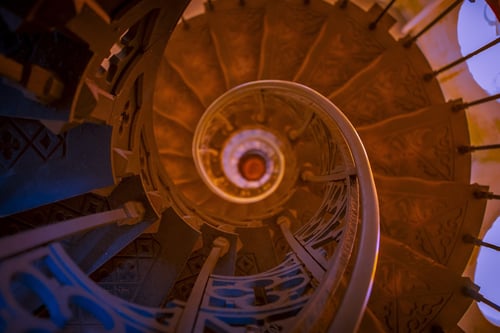Our approach to the (poly)crisis is part of the crisis?
We can actively repattern & rewire in the direction
of radically different (imagined) regenerative futures?
-
We use living systems thinking to explore the dynamic patterns of a system and how we can shift them in order to shift the system itself.
-
We use this to see, sense into, and name key patterns & dynamics that help fuel the polycrisis, co-creating a joint understanding of what helps inform and drive this convoluted moment.
-
We use this to explore how we can untangle, re-imagine, re-wire, and re-pattern from the notion that change is not linear, and many small steps can result in sudden, significant shifts.
-
We apply past, present and future awareness and lean into imgaination & emergence to reveal repatterning pathways towards systems health.

The future is a dance between patterns and events -
Boulton et al, Embracing Complexity





About Us
The Repatterning Collective is guided by two "What if" questions:
- What if - our approach to the (poly)crisis is part of the crisis?
- What if - we can actively repattern and rewire in the direction of radically different (imagined) regenerative futures?
Many people ask themselves these days how we can meet this convoluted moment, as the climate crisis and other major crises increasingly spiral out of control. And some wonder if we can meet the moment at all.
Part of the answer lies in understanding patterns & dynamics, as today's systems and societies weren’t built overnight. They are sustained by culture, relationships, and power. If we don’t work at this level, we’re at risk of just scaling broken models.
One of the most powerful ways to move past these barriers is to see the pattern inside them; the energy flowing through them, and the way these patterns cascade in chain reactions. When we name the pattern, we can take away its power. When we recognize the loop, we can reclaim the choice to step out of it.
Patterns however are often sticky, making it difficult to change the ones that don’t serve us well; and to build new patterns that make the old ones obsolete. Patterns and their interactions play a crucial role in informing and driving a system and its outcomes, whether it's the historical patterns that got us to where we are today or the patterns of human behaviour. They're like the hidden wiring underneath the system. And if we don’t consciously rethink the foundations of our designs, we risk perpetuating them.
What this tells us is that to transform a system, we have to hone our pattern literacy – how to spot and track patterns; to understand which ones may be ripe for disruption or strengthening; and how we can then use these insights to change multiple interconnected patterns and their interactions (with the system’s infrastructure, constructs, designs, mindsets and worldviews) in order to change the system itself.
There are no easy or single answers as how to repattern. Rather, we have to be willing to explore, take many small steps and work with emergence, engaging in an iterative and reflective process of untangling, re-imagining, re-wiring, and re-patterning. Imagination hereby has the critical ability to free us from the practicality of applied patterns of thinking and doing, allowing us to lean into and try out new pathways.
Many of us already do this and some of us are very good at it. Even more of us lack sufficient skill and insight to be truly effective pattern spotters and re-patterners. And we see ample examples where our collective or individual responses keep repeating or perpetuating the very patterns we intend or at least ought to disrupt.
This is why The Repatterning Collective is creating a pipeline of exploratory and applied learning on repatterning. To hone our ability for and deepen our understanding of repatterning, as a critical component of transformation in the increasingly complex and daunting world we’re facing today.
Vision
The Repatterning Collective is inspired by the idea of incubating a 'Bell Labs for a new world’.
An experimental container and "idea lab" for actors to jointly discover and engage in the practice of (re)patterning, as a critical component of systems redesign and the pluriverse of innovation taking place in the Horizon 2 of paradigm shift.
In doing so, it also aims to support a move away from the pervasive pattern of fighting our global crises as individuals and instead help us forge a deeply collective response.

The old world is dying, and the new world
struggles to be born; now is the time of monsters.
— Antonio Gramsci

What we do
The Repatterning Collective is currently exploring multiple strands of inquiry into repatterning, some of them in close collaboration with aligned partners:
- Developing and trialing a toolbox of facilitated & self-guided approaches to meaningfully engage practitioners in pattern literacy & repatterning towards a regenerative future, in collaboration with partner Societal Dynamics.
- A series of concise interviews with cross-sections of practitioners in the “change” field, bringing out insights and learnings on how repatterning is perceived and applied.
- The application of a repatterning lens to specific inquiries and critical challenges as part of the unfolding polycrisis. This includes the delivery of a series of online learning sessions, in collaboration with partner Kincentric Leadership, as part of a Co-creation with the More-than-Human sandbox.
- The potential of AI and machine learning, as an exemplar of pattern recognition, to support practitioners with bespoke guidance on repatterning for their challenges at hand.

“Those that fail to learn from history, are doomed to repeat it” (Winston Churchill)
"It's easier to imagine the end of the world than the end of capitalism" (Frederic Jameson)
“We'll go down in history as the first society that wouldn't save itself because it wasn't cost-effective” (Kurt Vonnegut)
“If solutions within this system are so impossible to find then maybe we should change the system itself.” (Greta Thunberg)

